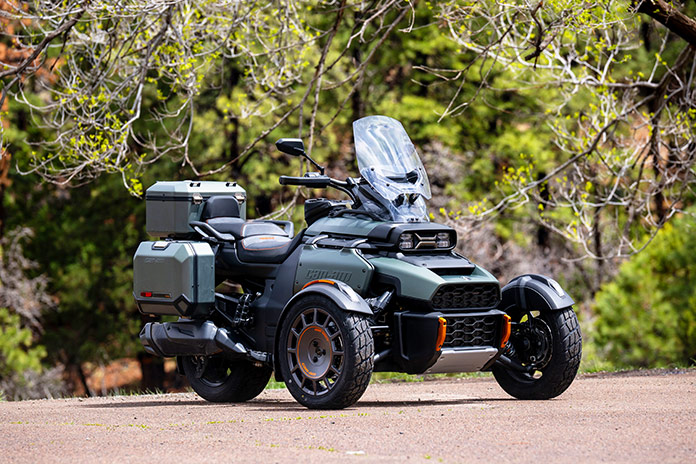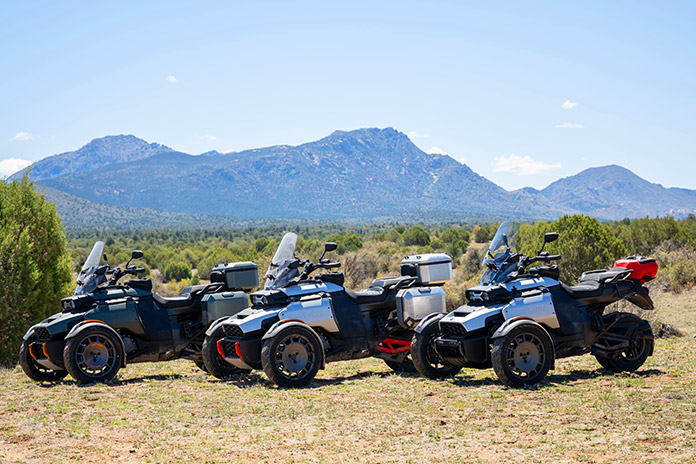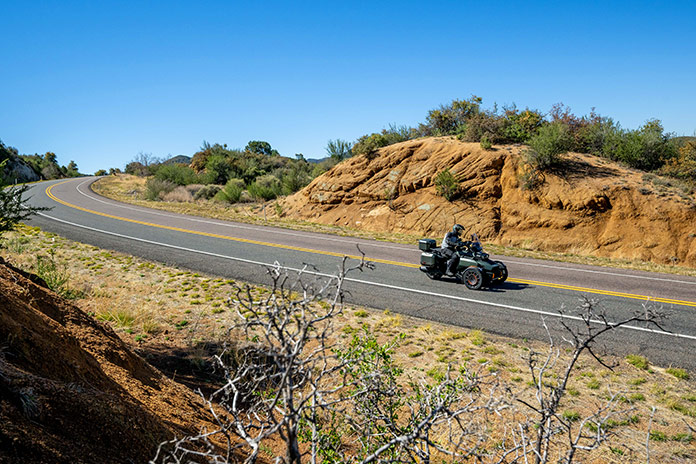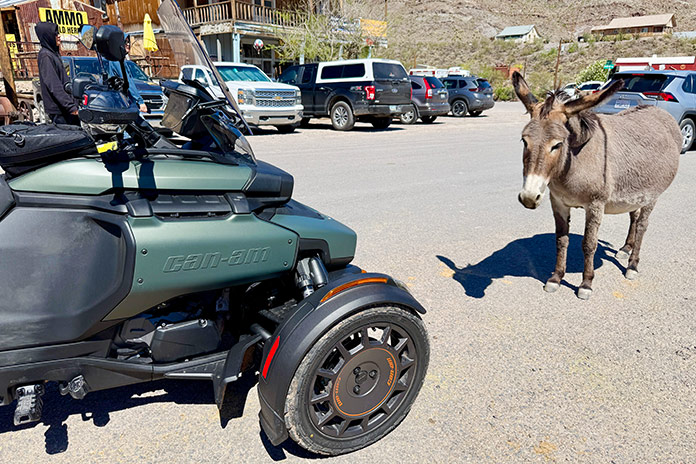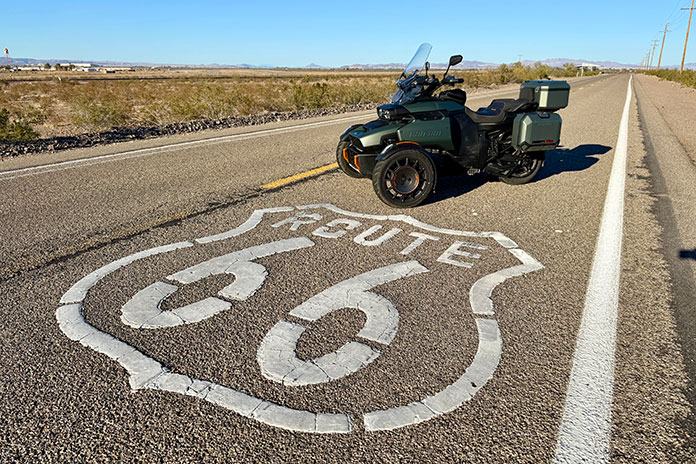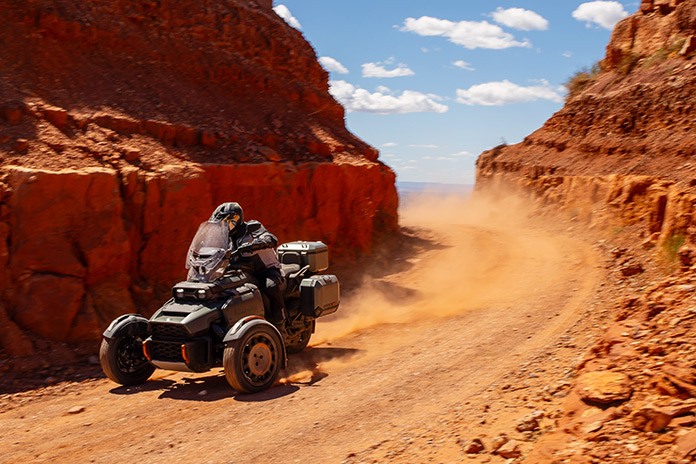
With the brand new Can-Am Canyon, BRP says it desires to “democratize all roads.” In different phrases, it desires journey to be accessible to extra folks, not simply those that have the talents to deal with a 600-lb journey bike. As a three-wheeler, the Can-Am Canyon gained’t tip over, so riders needn’t concern the restricted traction of unpaved roads.
Despite the fact that I’ve ridden hundreds of miles on dust, sand, and gravel on ADVs, I nonetheless get the willies on free surfaces. I’ve had numerous tip overs – largely minor ones however some that broke each bike and bone – and I understand how rapidly issues can go from yeeha! to oh sh*t! However once I rode the Can-Am Canyon on sandy, rocky, muddy roads in Arizona, it felt carefree and practically easy.
Again to the Future
Considered one of my first assignments as a wet-behind-the-ears staffer at Rider was to take a look at the 2008 Can-Am Spyder RS a number of months after it was launched. I’d by no means ridden a trike or sidecar earlier than, and the Spyder’s two-wheels-in-front “Y-architecture” was completely international to me.
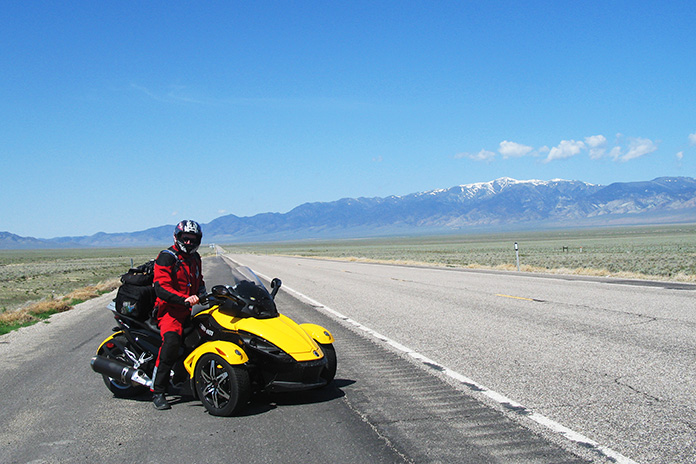
Former EIC Mark Tuttle tossed me the Spyder’s key and mentioned, “Hit the street.” So I did, spending the following week driving 2,600 miles via 4 states. That was a enjoyable expertise on a singular machine. Having examined numerous Spyder and Ryker fashions within the years since, I tip my hat to BRP for the regular evolution and enlargement of its three-wheeled lineup.
What began out as a single mannequin to check the Spyder’s viability out there 17 years in the past has since grown to incorporate 4 mannequin households: the compact, reasonably priced Ryker; the cruiser-style Spyder F3; the touring-focused Spyder RT; and now the adventure-ready Canyon. In all, there are 13 fashions to select from. Upwards of 300,000 Rykers and Spyders have been offered worldwide, so what was as soon as a proof of idea has change into a power to be reckoned with.
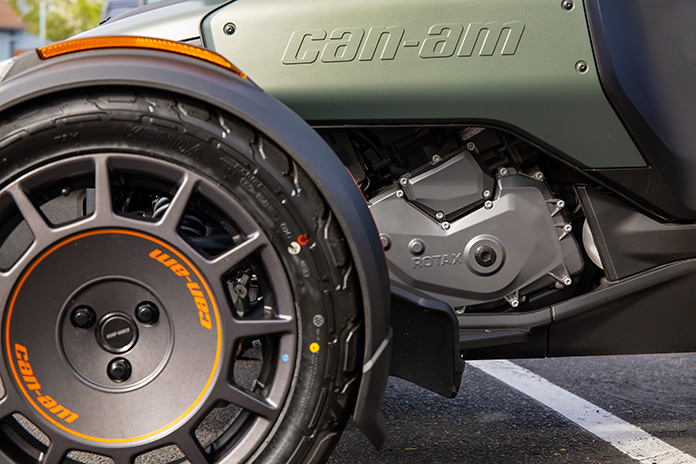
All Can-Am three-wheelers are powered by variants of the liquid-cooled Rotax ACE (Superior Combustion Effectivity) engine. In Spyder and Canyon fashions, it’s the Rotax 1330 ACE inline-Triple that’s rated at 115 hp at 7,250 rpm and 96 lb-ft of torque at 5,000 rpm. Mated to the engine is a 6-speed clutch-less semi-automatic transmission (upshifts are guide through paddle shifters, downshifts are computerized) with reverse, and energy is shipped to the rear wheel through belt.
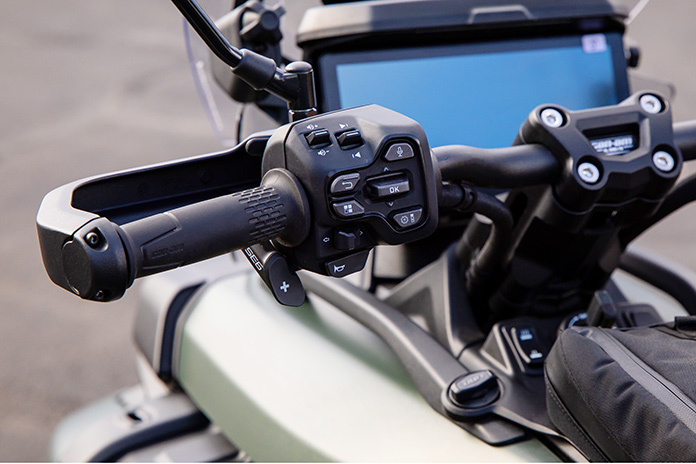
The Grand Canyon
On the Canyon’s press launch in Prescott, Arizona, BRP reps made the purpose – a number of instances – that regardless of its rugged, three-wheeled SUV look, the Canyon is an on-road car. In contrast to Can-Am’s ATVs and side-by-sides, the Canyon will not be designed to go off-road, however it may possibly deal with tough unpaved roads riddled with rocks, ruts, and different obstacles.
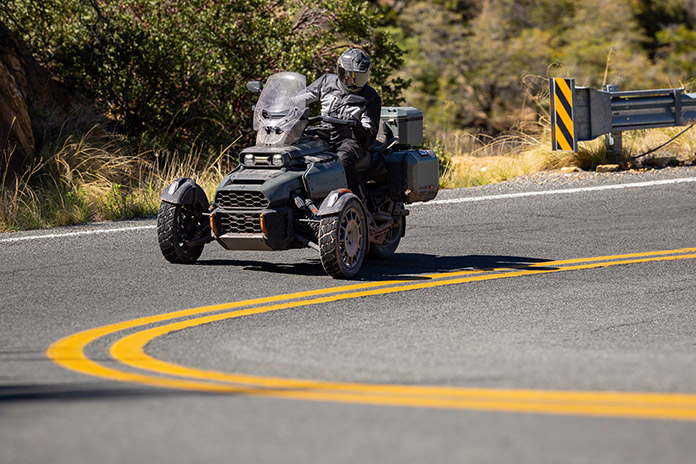
To take care of such calls for, the Canyon is taller than its Spyder and Ryker siblings. It has a excessive strategy angle and 6.3 inches of floor clearance, in comparison with 4.5 inches on the Spyder RT and 4.8 inches on the Ryker Rally. It additionally has extra suspension journey, with 10.2 inches in entrance and 9.2 inches on the rear (Spyder RT: 6.9/6.0 inches; Ryker Rally: 7.3/7.0 inches). And it has XPS Journey tires with giant tread blocks to offer traction on free surfaces and grip on pavement.
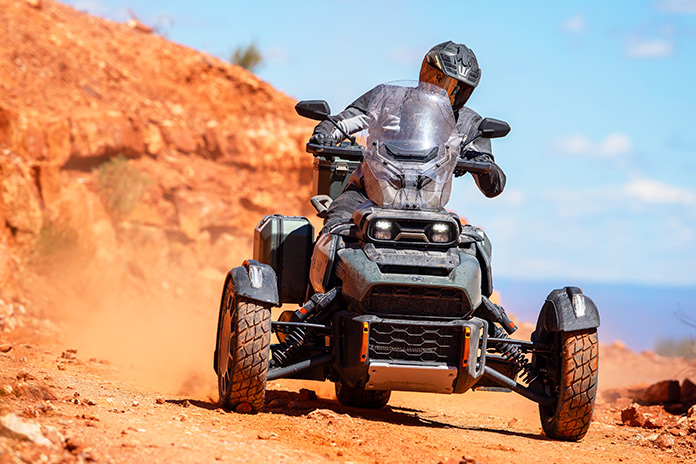
To guard it from rocks, brush, and particles, the Canyon has handguards, a metallic radiator grille, and a drive belt protector. A 5.6-inch handlebar riser offers an upright seating place and permits the rider to face up over tough terrain. Anti-slip enduro footpegs assist hold ft in place when the going will get powerful.
Like Spyders and Rykers, the Canyon has a set of digital rider aids that features stability management, traction management, hill maintain management, ABS, and dynamic energy steering (not accessible on Rykers). It additionally has 4 journey modes: All-Street, Sport, Regular, and Rally.
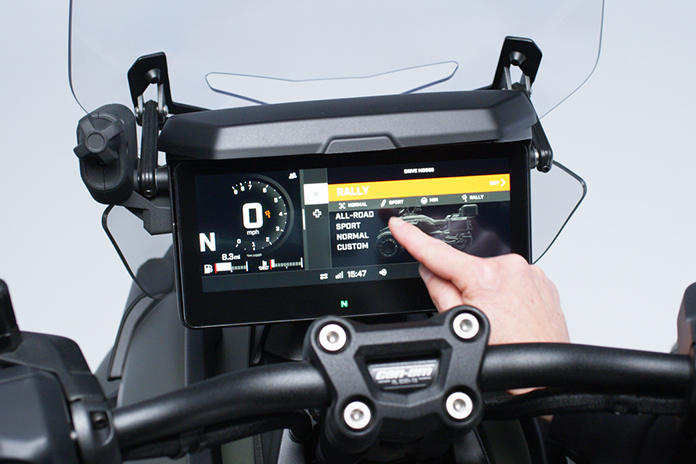
Behind the manually adjustable windscreen is a weatherproof glovebox with a USB-A port for charging a smartphone. A ten.25-inch touchscreen TFT show consists of Apple CarPlay connectivity (with an iPhone plugged in and a helmet communicator paired). Android Auto is within the works, and as soon as prepared it may be added through an over-the-air replace.
Three mannequin variants can be found. The bottom-level Canyon ($25,299) has all of the options described above. Its entrance suspension consists of double A-arms with an anti-roll bar and a nonadjustable Sachs Huge-Bore shock for every wheel, and its rear suspended by a nonadjustable Sachs shock. The Canyon XT ($29,799) provides a skid plate, detachable rubber inserts for the enduro footpegs, self-leveling air preload adjustment for the rear shock, aluminum circumstances, a consolation seat, a passenger backrest, and heated grips for the rider and passenger. The Canyon and Canyon XT can be found in Silver Sterling Satin.
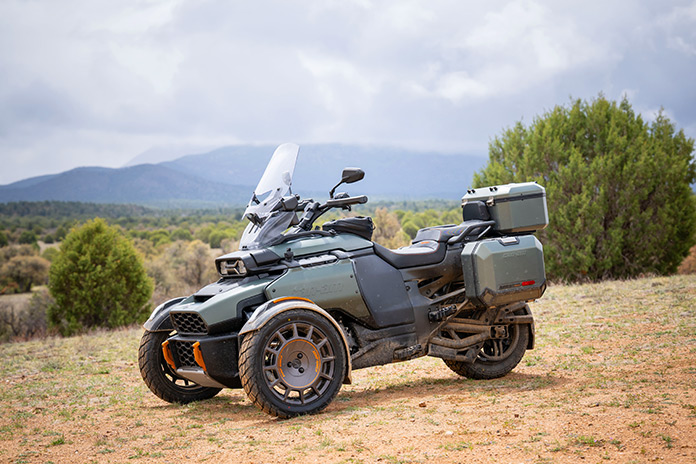
The highest-of-the-line Canyon Redrock ($32,299) is well recognized by its Moss Inexperienced Satin paint, which reminds my spouse of a navy car, and my brother mentioned it appears to be like like “Rambo’s three-wheeler.” The Redrock has all of the XT’s options plus KYB Good-Shox semi-active suspension (which replaces the Sachs suspension), a back-up digital camera, and a Customized journey mode that permits preferences for throttle response, traction management, energy steering, and suspension to be saved.
When the Pavement Ends
Arizona has over 75,000 miles of paved roads and practically 1,900 miles of unpaved roads, and a number of the better of each are within the northern a part of the state. From our base in Prescott, which sits 5,300 ft above sea stage within the foothills of the Bradshaw Mountains, our take a look at journey started on the sweeping paved curves of Iron Springs Street.
I tailored to the driving fashion of Can-Am’s three-wheelers years in the past. They don’t lean and don’t countersteer, however they do have handlebars, footpegs, and a motorcycle-style seating place. You flip by direct steering: pushing the surface grip whereas weighting the surface peg to counteract centrifugal forces.
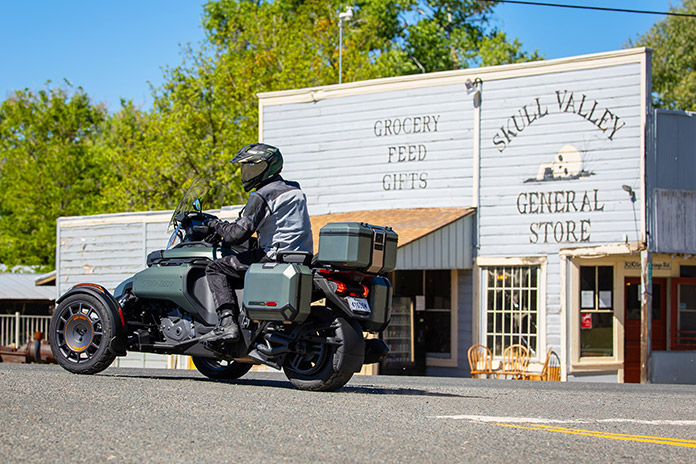
GEAR UP
For this take a look at, I rode solely the Redrock mannequin, the primary Can-Am three-wheeler to be supplied with semi-active suspension. On each bike we’ve examined with digital suspension that adapts damping in response to circumstances, we’ve praised it for retaining the chassis steady and composed. The identical is true on the Canyon Redrock, particularly when bouncing over tough terrain. The damping turns into more durable or softer as wanted when accelerating, braking, or turning, and the bottom settings are totally different for every journey mode.
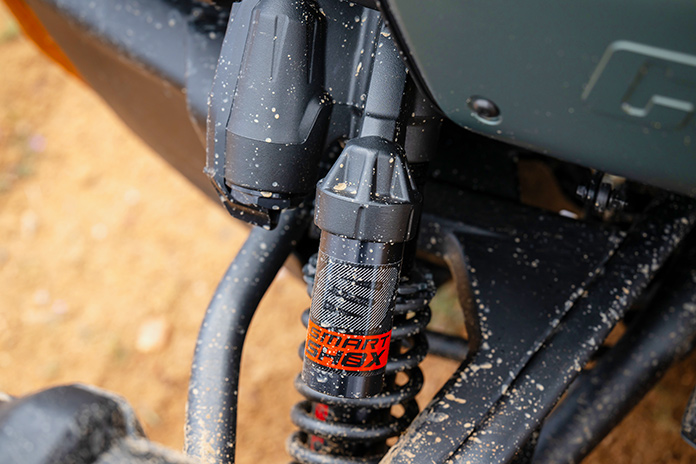
The Redrock delivers a luxurious, managed journey on pavement, and the Good-Shox do a greater job of compensating for weight switch and physique roll than the nonadjustable suspension on Spyders and Rykers. Because it rides taller, the Canyon has a taller seat peak – 33.2 inches versus 29.7 inches on the Spyder RT – however that doesn’t actually matter because you don’t have to face over the seat at a cease such as you do on a motorbike. A tall seat peak is likely one of the main obstacles for many individuals who need to journey journey bikes, and the Canyon eliminates that drawback.
After some miles on pavement, I used to be desirous to get the Canyon on unpaved roads. Because it seems, I had beforehand ridden a lot of our take a look at route years earlier than on a full-sized journey bike, and I recalled that a lot of the unpaved roads had a agency base however their floor was lined with free sand, dust, gravel, or actually tough embedded rock.
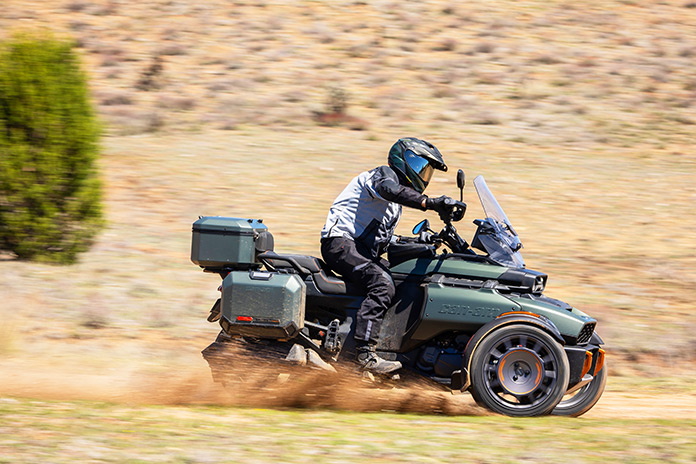
As quickly as we left the pavement, I switched to Rally mode, which reduces traction management intervention on the rear wheel and selects the Regular engine mode, Sport suspension mode, and Minimal energy steering stage. In contrast to Rally mode on the 668-lb-dry Ryker Rally, which turns off traction management utterly to permit energy slides and donuts, the Canyon’s Rally mode is extra conservative, partly as a result of it’s a 1,036-lb machine (curb weight for the Redrock).
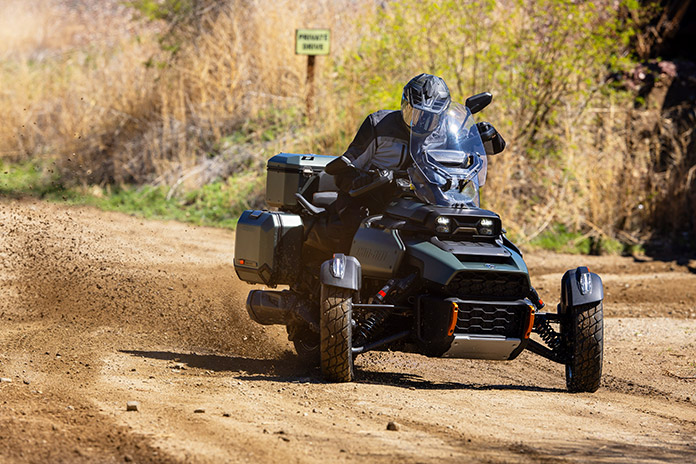
Nonetheless, grabbing a handful of throttle spins up the rear wheel and permits some gentle drifting. The bottom line is to remain onerous on the gasoline and steer into the flip. Because the Canyon is an on-road car, ABS can’t be shut off, so some care is required when hooning round on free surfaces. Stomp onerous on the brake pedal, which prompts the brakes on all three wheels (Brembo 4-piston calipers up entrance, 1-piston caliper out again, and 270mm discs), and the Canyon will come to a cease quick, pavement or not. However onerous braking in a nook will trigger the Canyon to push (understeer), which is unsettling on a mud street that may have a ditch – or worse – on the far aspect.
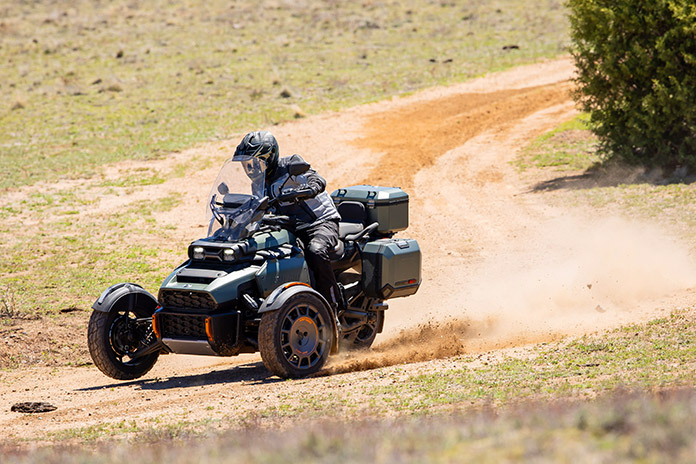
Select Your Personal Journey
Sandy corners, patches of mud, free gravel and rocks – the Canyon eats all of it up. I discovered the route a lot simpler to journey on a Canyon than on an journey bike as a result of I by no means nervous about skidding resulting from overbraking, tucking the entrance wheel on free terrain, or any of the frequent tip-over situations.
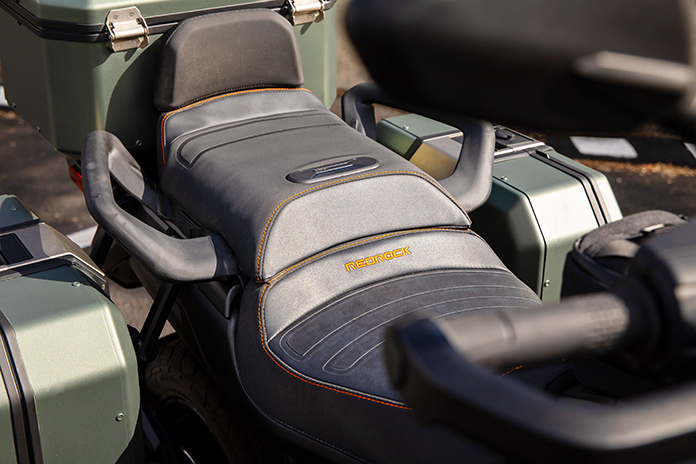
You don’t should mess around like I did, however it was a lot enjoyable and drama-free that I couldn’t assist myself. Many Canyon house owners will in all probability take a extra relaxed strategy to navigating unpaved roads, and so they’ll be handsomely rewarded. Whether or not you need to go tenting, looking, or simply exploring, the Canyon is designed to be a versatile journey platform to get you, your passenger, and your gear there in consolation. Can-Am provides 25 devoted equipment for the Canyon lineup, which permits house owners to tailor their machines to their most well-liked kind of journey.
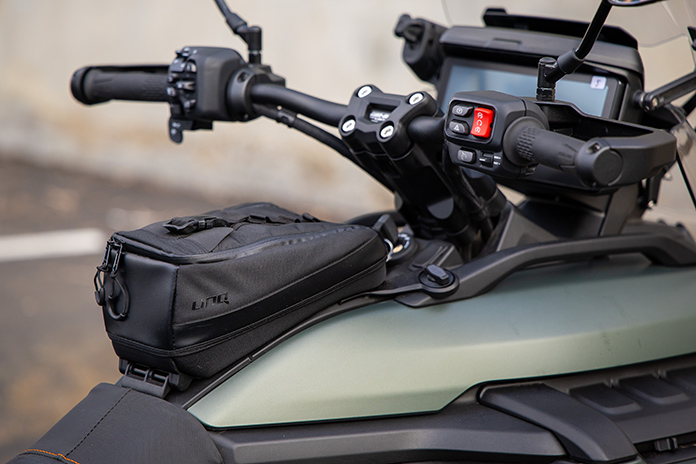
The XT and Redrock’s 31.7-gallon (120-liter) aluminum circumstances are detachable, and they are often added as equipment to the base-level Canyon. There are 21 attachment factors for Can-Am’s unique LinQ system, and beneath the detachable passenger seat is a big LinQ plate with Lite, Nano, and 16-inch attachment factors. Storage choices embody modular packing containers in a number of sizes, a cooler, a gasoline caddy, and a software package. There’s additionally a bigger 32-inch LinQ Journey Plate that’s appropriate with a 63-liter low-profile field or a 70-liter storage bag. Different equipment embody interior luggage for the aluminum circumstances, a small tankbag, GoPro digital camera mounts, an journey entrance bumper, LED fog lights, headlight protectors, handguard deflectors, a trailer hitch, Sport and Excessive windscreens, rider and passenger backrests, covers, and different gadgets which are commonplace on the XT or Redrock.
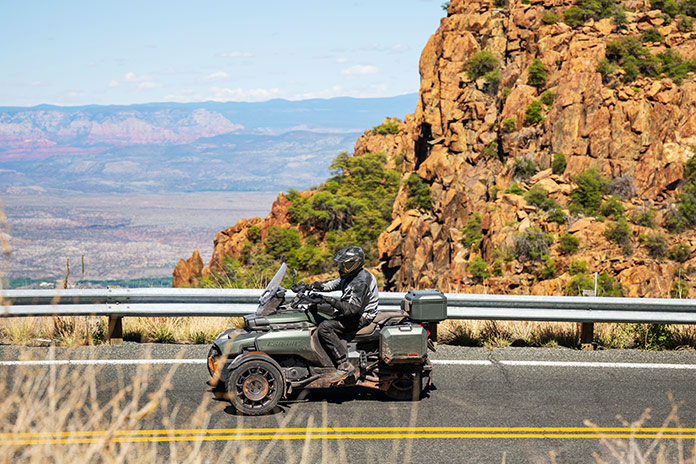
Get Your Kicks
After our one-day take a look at journey round Prescott, I loaded my gear right into a Redrock and took a scenic route again residence to California. After getting a great really feel for the Redrock’s efficiency on unpaved roads, I wished to get a greater sense of its touring capabilities.
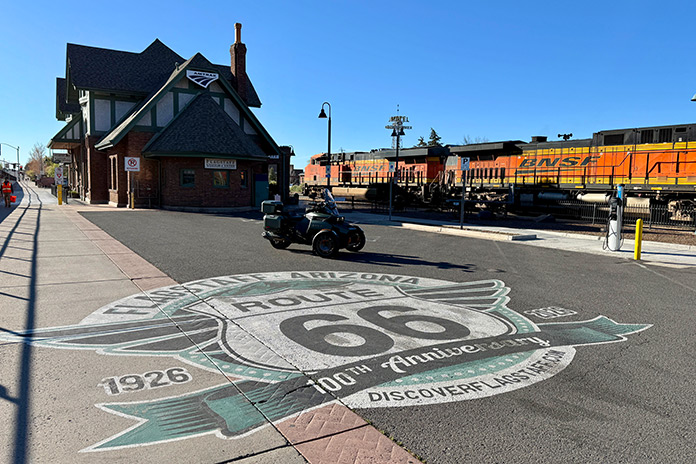
As I left Prescott at 5:30 a.m., the solar was simply arising, and it was within the low 50s. The very first thing I did was crank up the grip and seat heaters and lift the manually adjustable windscreen. Since I might be following main state highways and Interstate 17 to Flagstaff, I chosen the Regular journey mode, which places the engine in Eco mode, suspension in Consolation mode, energy steering on Most, and traction management on Regular. Eco mode softens throttle response and barely limits energy to encourage gasoline effectivity, however I didn’t discover a lot distinction in response between it and the Regular engine mode. Energy supply is linear and easy, with nearly no detectable engine vibration.
The Canyon’s ergonomics lend themselves to long-haul consolation. The handlebar is large and upright, the seat is large, flat, and well-padded, and there may be loads of legroom. The windscreen and elective handguard deflectors ($99.99) half the wind easily, and the large entrance fairing protects the rider’s legs from wind.
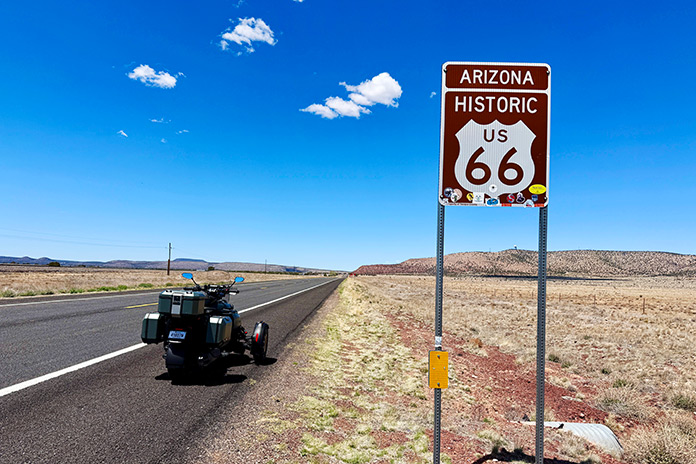
I stashed small necessities – a hat, a bottle of water, my Garmin inReach, and many others. – within the elective LinQ Nano waterproof tankbag ($149.99), which clips securely to the fairing close to the entrance of the rider’s seat and locks in place through two LinQ attachment factors on both aspect of the ignition key. At gasoline stops, I turned the 2 LinQ locks 90 levels and hinged the bag out of the best way to entry the gasoline filler.
Despite the fact that the Canyon has a 7.1-gallon tank, it’s a giant, large machine that weighs 1,036 lb, so gasoline stops had been frequent. My gasoline economic system ranged from a low of twenty-two.9 mpg (162.5 miles of vary) when driving at a quick tempo to a excessive of 29.0 mpg (206.2 miles) when cruising. Throughout my 678-mile journey from Arizona to California, I averaged 26.6 mpg (188.7 miles of vary).
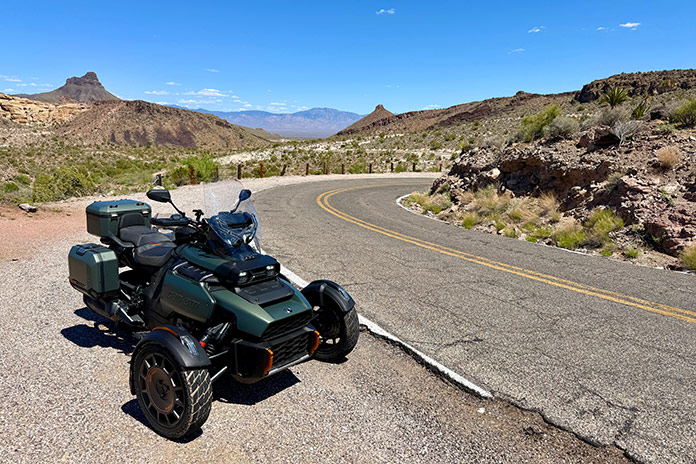
From Flagstaff, I adopted Historic Route 66 as I rode west. Typically I adopted the unique street, similar to via cities like Flagstaff and Williams, on an extended stretch from west of Ash Fork to Kingman, and on Nationwide Trails Freeway in California. Different instances, as necessity required, I rode alongside Interstate 40, which changed Route 66 in lots of areas. Whether or not I used to be driving via cities, on backroads, or on the interstate, the Canyon delivered a easy, snug journey.
On Oatman Freeway, by far probably the most technical part of Route 66, I put the Canyon in Sport mode, which selects the Regular engine mode, Sport+ suspension mode, Medium energy steering, and Regular traction management. Hustling a giant three-wheeler just like the Canyon on a decent, twisty street requires effort as a result of you’ll want to push the handlebar forwards and backwards and use leg and core power to battle in opposition to g-forces, however it’s responsive and the semi-active suspension eats up tough pavement prefer it’s nothing. The steadiness of the three wheels was very reassuring on quite a few elements of Oatman Freeway that had been lined in gravel and sand from a current flash flood.
Dwelling Run
BRP has one other profitable three-wheeled platform on its fingers with the Can-Am Canyon. It has the rugged styling that’s so widespread at present on each journey bikes and SUVs, and it has the capabilities to take extra riders farther from civilization. The three Canyon fashions and the vary of equipment present numerous choices for various patrons. Specifically, the top-of-the-line Canyon Redrock is an distinctive machine geared up with state-of-the-art semi-active suspension and a full slate of helpful options. I’m able to load it up once more and hit the street.
2025 Can-Am Canyon Redrock Specs
- Base Worth: $32,299
- Worth as Examined: $32,549 (LinQ Nano tankbag, handguard deflectors)
- Web site: Can-Am.BRP.com
- Guarantee: 2 yrs., unltd. miles w/ roadside help
- Engine Kind: Liquid-cooled, transverse inline-Triple, DOHC w/ 4 valves per cyl.
- Displacement: 1,330cc
- Bore x Stroke: 84.0 x 80.0mm
- Horsepower: 115 hp @ 7,250 rpm (manufacturing facility declare)
- Torque: 96 lb-ft @ 5,000 rpm (manufacturing facility declare)
- Transmission: 6-speed semi-automatic w/ reverse
- Last Drive: Belt
- Wheelbase: 67.6 in.
- Rake/Path: n/a
- Seat Top: 33.2 in.
- Moist Weight: 1,036 lb (manufacturing facility declare)
- Gas Capability: 7.1 gal.
- Gas Consumption: 26.6 mpg
- Estimated Vary: 189 miles


